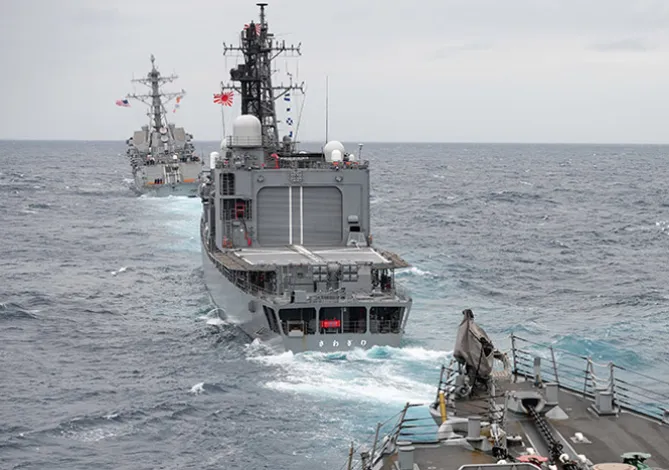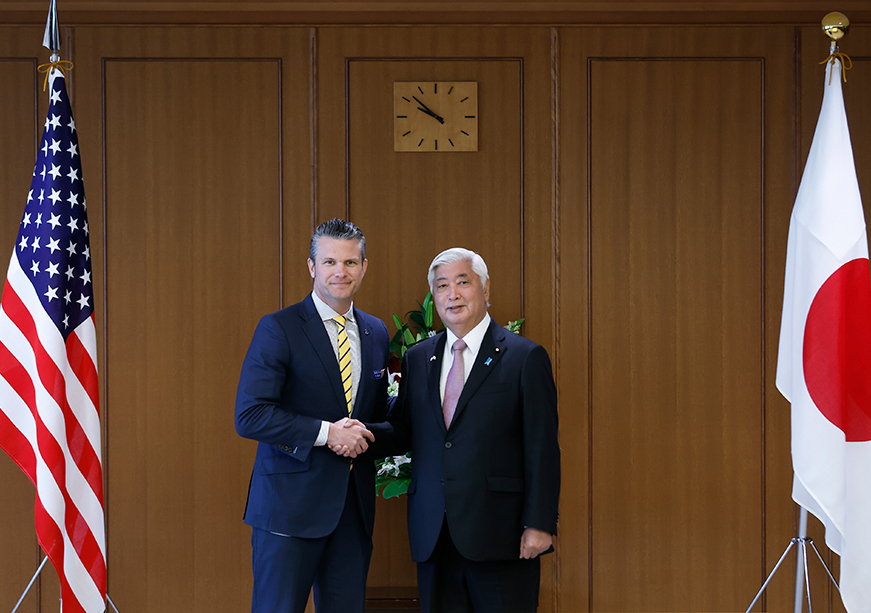
Today, Japan is no longer a bystander in the international security and defence fields. Tokyo is now actively promoting and establishing defence cooperation with wide-ranging countries and has launched a new programme that provides security aid to developing countries.
On 3 November 2023, during Japanese Prime Minister Fumio Kishida’s visit to Manila, Japan signed an agreement with the Philippines, committing 600 million yen in Official Security Assistance (OSA) grant aid for supplies of military equipment that would enhance the Philippine security and deterrence capabilities. Two weeks later, Japan signed a similar agreement with Bangladesh, committing 575 million yen under OSA.
Similarly, an agreement committing 400 million yen to Malaysia under OSA was signed on 16 December 2023, on the sidelines of the Tokyo summit, commemorating 50 years of Japan and the Association of Southeast Asian Nations (ASEAN) ties. Japan signed the fourth and final agreement for the current fiscal year with Fiji two days later, committing 400 million yen.
The budget for the programme is likely to increase annually, and more countries are likely to be aided under it because Japan has committed to increasing its defence budget over the next five years, of which a small part will support OSA.
Providing military grant aid to developing nations in the Indo-Pacific region is a new programme Japan established in April 2023. For fiscal 2023-24, Japan allocated 2 billion yen for this programme. Although small and limited to a few nations initially, this programme signifies a new direction in Japan’s long-held policy of not aiding foreign militaries. The budget for the programme is likely to increase annually, and more countries are likely to be aided under it because Japan has committed to increasing its defence budget over the next five years, of which a small part will support OSA.
Although Japan’s Ministry of Foreign Affairs administers both, OSA differs from Official Development Assistance (ODA). As a member of the Organisation for Economic Cooperation and Development (OECD), Japan has been one of the most significant aid donors to developing countries since the ODA programme was established in the post-Second World War era. Preliminary OECD data indicate that Japan was the third largest donor in 2022, spending nearly US$17 billion on developing countries. Given Japan’s pacifist constitution and imposed constraints, Tokyo refrained from military-type aid. It allocated its ODA budget only for non-military purposes, such as human security, maritime security, and peace-building
Japan has taken this new policy direction because of its assessment of the changing global strategic environment and shifting military balance in the Indo-Pacific region. China’s growing military assertiveness, North Korea’s sabre rattling, the war in Ukraine and Japan’s commitment to a Free and Open Indo-Pacific have driven Tokyo to a new path-breaking course. Tokyo has skilfully crafted this new direction without changing the peace norm of the Constitution that prohibits military activities by introducing new legislation in support of its national security strategy, as articulated in the two documents Tokyo issued in 2013 and 2022.
China’s growing military assertiveness, North Korea’s sabre rattling, the war in Ukraine and Japan’s commitment to a Free and Open Indo-Pacific have driven Tokyo to a new path-breaking course.
Japan began to use ODA strategically after the 2013 NSS and the 2015 Development Cooperation Charter, which some regard as securitisation of aid or providing ODA for security purposes. Following the 2013 NSS language, the 2015 Charter incorporated the phrase ‘pro-active contribution to peace’, under which Japan began to offer ‘capacity building’ support to developing countries. Support essential to maintaining regional peace, stability, the rule of law, and maritime sovereignty began to be provided under the new Charter. This included the supply of surveillance boats to Vietnam and the Philippines and capacity-building assistance to Indonesia, Malaysia, and Myanmar. Even before the 2015 Charter, Japan supplied three patrol boats to Indonesia, using its grant aid to combat terrorism and piracy, allowed under the 2003 ODA Charter.
The four nations that have received military-related aid under the new OSA in 2023 are Indo-Pacific ‘like-minded’ nations, strategically located and important to Japan’s security interest and foreign policy objectives, and each faces significant strategic challenges from China.
Malaysia, for example, disputes China’s claims of territorial rights in the South China Sea. With Chinese vessels entering the country’s exclusive economic zone, Japan has decided to support Malaysia to deter China. Malaysia’s strategic location connecting the Indian Ocean and East Asia is crucial for sea transportation. Moreover, the two countries have elevated their ties to the ‘Comprehensive Strategic Partnership’. Japan’s military aid is believed to improve security capabilities and surveillance of the critical sea lanes.
With Chinese vessels entering the country’s exclusive economic zone, Japan has decided to support Malaysia to deter China.
Similarly, the Philippines is vital for the protection of sea lanes. Still, more importantly, the country is crucial to maintaining regional security and stability, mainly because Japan believes that a Ukraine-like situation may arise in the Indo-Pacific, that is, a possible Chinese invasion of Taiwan. Since the coming of President Ferdinand Marcos Jr. into office in the Philippines, Tokyo has elevated its defence and other ties with Manila. A Reciprocal Access Agreement (RAA) is currently being negotiated, and when signed, this will be Japan’s first RAA with an ASEAN member.
Bangladesh will receive four patrol boats under OSA for surveillance and maritime security in the Bay of Bengal, a crucial part of the Indo-Pacific. Notably, Bangladesh has been one of the largest recipients of Japan’s ODA in recent years. The China factor also plays a crucial role in Japan’s thinking. Fiji will also receive patrol boats for the ‘maintenance and enhancement of maritime security in the seas around Fiji and Indo-Pacific region’. As China’s influence rises in the South Pacific, Japan attempts to blunt it with ODA and now also with OSA.
Although, at the moment, OSA remains low-key with only a small budget of under US$20 million, this programme is likely to expand. The Japanese government is in conversation with Vietnam and Djibouti as two other potential ‘like-minded countries’ to receive OSA in the next fiscal year, which will begin in April 2024. In November, Japan upgraded its ties with Vietnam to a ‘comprehensive strategic partnership’, and their bilateral relationship has strengthened, particularly in the economic field, with many Japanese companies investing in Vietnam. Furthermore, Vietnam has a dispute with China in the South China Sea. Djibouti in East Africa, on the other hand, hosts a temporary base for Japan’s defence personnel for anti-piracy purposes and acts as a counterforce to China’s presence.
The Japanese government is in conversation with Vietnam and Djibouti as two other potential ‘like-minded countries’ to receive OSA in the next fiscal year, which will begin in April 2024.
Japan also may have a larger agenda behind the provision of OSA. Japan has long been trying to export military wares to foreign countries, including amphibian aircraft to India. But Japanese companies have yet to be successful in any such deal. It is possible, as one analyst puts it, that the insight and lessons learnt from OSA could be used to design larger-scale defence equipment transfers, using loan arrangements similar to what Japan has been doing in large infrastructure projects such as the bullet train project in India.
Purnendra Jain is an Emeritus Professor in the Department of Asian Studies at the University of Adelaide.
The views expressed above belong to the author(s). ORF research and analyses now available on Telegram! Click here to access our curated content — blogs, longforms and interviews.




 PREV
PREV


